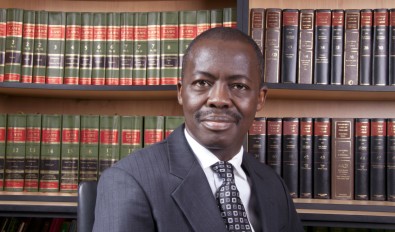
1.0 THE AGITATION FOR FINANCIAL AUTONOMY OF THE NIGERIAN JUDICIARY
The Constitution of the Federal Republic of Nigeria 1999 which is anchored on a tripod of the Executive, Legislature and the Judiciary made specific provisions for the funding of the three arms of government from the nation’s treasury.
From the inception of the Third Republic the financial autonomy of the Judiciary which is embedded in the Constitution has proved a mirage. The Judiciary has been underfunded perennially by the Federal and State Governments. Worse still, the meagre sum allocated to it in the yearly budgets is never released early or in full. Going cap in hand to the Executive for funds is a recurring ugly experience for Heads of Courts. The dysfunctional justice system is partly due to inadequate funding of the judiciary as it continues to grapple with decrepit infrastructure and poor remuneration of judicial officers and other personnel.
2.0 LEGAL ACTION BY JUDICIARY STAFF UNION OF NIGERIA (JUSUN)
In 2013, the Judiciary Staff Union of Nigeria(JUSUN) instituted an action constituted as SUIT No: FHC/ABJ/CS/667/13 against the National Judicial Council, the Attorney-General of the Federation and the Attorneys General of the States and claimed reliefs for the implementation of the financial autonomy of the Judiciary in accordance with the provisions of the 1999 Constitution. The Honourable Justice Adeniyi Ademola of the Federal High Court, Abuja delivered judgment in the suit on the 14th day of January, 2014 and granted the following reliefs:
i) A declaration is hereby made that the 2nd-74th Defendants’ failure, neglect and/or refusal to pay the Funds/Amount standing to the credit of the States’ Judiciary is a Constitutional breach which has to be abated forthwith.
ii) That an Order is hereby made that the piece-meal payments/allocation of funds through the States’ Ministry of Finance to the States Judiciary at the 2nd-74th Defendants pleasure is unconstitutional, unprocedural cumbersome, null, void and be abated forthwith.
iii) That an Order is hereby made mandating/compelling the 2nd-74th Defendants to comply with the provision of section 81(3), (4) (3) and 162(9) of the 1999 Constitution (as amended) in the disbursement of funds to the head of Courts forthwith
iv) That an Order of Perpetual injunction is hereby made restraining the 2nd-74th Defendants, their agents, assigns, privies etc from committing any further breach of the aforesaid Constitution/statutory provisions.
None of the 36 States appealed against the judgment in the JUSUN action yet they did not comply with the orders made by the Court. Their disobedience to the orders of the Court necessitated the January 2015 strike action by JUSUN.
READ ALSO:
In BABATUNDE & ORS V OLATUNJI & ORS. (2000) 2 S.C. 9; (2000) 2 NWLR (PT 646) 557 KATSINA-ALU JSC (as he then was) reiterated the legal effect of a judgment:
“It is settled practice that there is a presumption of correctness in favour of a Court’s judgment. Unless and until that presumption is rebutted and the judgment is set aside, it subsists and must be obeyed. It cannot for any reason under our law be ignored.”
The Governors of the 36 States are bound by the Judgment in the JUSUN action and must obey the same.
3.0 SECTION 162(9) OF THE CONSTITUTION
The Third relief granted by ADEMOLA J in the JUSUN action is an order compelling the 2nd-74th Defendants to comply with the provision of Section 162(9) of the 1999 Constitution in the disbursement of funds to the head of Courts forthwith. Section 162(9) of the Constitution provides:
‘’ Any amount standing to the credit of the judiciary in the Federation
Account shall be paid directly to the National Judicial Council for disbursement to the heads of courts established for the Federation and the States under section 6 of this Constitution.’’
In A-G FEDERATION V A-G ABIA No 2 (2002) 4 S.C (PT. I) 1; (2002) 6 NWLR (PT 764) 542 the Supreme Court held that payment of salaries and allowances of judicial officers and recurrent expenditure from the Federation Account is unconstitutional. UWAIS CJN said :
‘’ It has transpired also that other deductions are being made from the Federation Account in respect of monies paid to National Judicial Council for funding the Federal and State and for funding joint venture contracts and the Nigerian National Petroleum Corporation priority projects. All these deductions are carried out as front line charge on the Federation Account. All the deductions are not provided for by the 1999 Constitution notwithstanding the provisions of section 162 subsection (9), in the case of National Judicial Council so that even if any enactment has provided for them, like the Appropriation Act by National Assembly, such is inconsistent with the Constitution and is therefore void to the extent of its inconsistency.’’
In view of the decision of the Supreme Court that payments being made to the National Judicial Council from deductions made from the Federation Account are not provided for by the Constitution, the order of ADEMOLA J in relation to Section 162(9) of the Constitution was made per incuriam.
4.0 EXECUTIVE ORDER No 10 BY PRESIDENT MUHAMMADU BUHARI
In the bid to ensure an implementation of the financial autonomy of State Legislature and State Judiciary in compliance with the Constitution, President Muhammadu Buhari has now made an Executive Order No 10-The Implementation of Financial Autonomy of State Legislature and State
Judiciary Order, 2020 which took effect on the 20th day of May, 2020. The President made the Executive Order on the premise that the implementation of financial autonomy of the State Legislature and State Judiciary will strengthen the institutions at the State tier of Government and make them more independent and accountable in line with the tenets of democracy as enshrined in the Constitution of the Federal Republic of Nigeria 1999 (as Amended).
The office of the President is a creation of the Nigerian Constitution hence no matter the right motives and good intentions of the President his acts and orders made by him must pass the validity test within the ambit of powers vested in him by the same Constitution.
The legitimacy of the Executive Order No 10 must therefore be viewed not from the desire of the President to deepen the tenets of democracy but from the lens of the Constitution which is the grundnorm. In ROSSEK V A.C.B. LTD & ORS (1993) 8 NWLR (PT 312) 382 OGUNDARE JSC said:
‘’A Constitution, in my respectful view, is the organic law of a country and it prescribes rights, powers, duties and responsibilities. It indeed, is the fons et origo from which all other laws derive their validity.’’
- EXECUTIVE POWERS UNDER SECTION 5 OF THE CONSTITUTION
The President said he made the Executive Order No 10 by the power vested in him under Section 5 of the Constitution of the Federal Republic of Nigeria 1999. There is a dichotomy in the executive powers of the Federation vested in the President and the executive powers of a State vested in the Governor of a State under Section 5 of the Constitution. The executive powers vested in the President and the Governors extend in like manner to the execution and maintenance of the Constitution within their spheres of authority in tandem with the doctrine of Federalism. In A-G LAGOS V A-G FED (2003) 6 S.C (PT. I) 24; (2003) 12 NWLR (PT. 833) 1 UWAIS CJN restated the autonomy of each government in the Federation when he said:
‘’ By Section 2(2) of the 1999 Constitution Nigeria shall be a Federation and by the doctrine of federalism, which Nigeria has adopted, the autonomy of each government, which presupposes its separate existence and its independence from the control of the other governments including the Federal Government is essential to federal arrangement. Therefore, each government exists not as an appendage of another government but as an autonomous entity in the sense of being able to exercise its own will in the conduct of its affairs, free from direction by another government.’’
Each of the 36 States of Nigeria is an autonomous entity free from direction by the Federal Government or the government of another State. The President clearly has no power under Section 5 of the Constitution or any other provision of the Constitution to set up an arrangement for the funding of the Legislature and Judiciary of any of the 36 States from the allocation due to the States from the Federation Account.
6.0 SECTION 121 OF THE CONSTITUTION
By Section 121 of the Constitution, the Governor of a State shall cause to be prepared and laid before the House of Assembly at any time before the commencement of each financial year estimates of the revenues and expenditure of the State for the next following financial year. Section 121(3) provides that any amount standing to the credit of the judiciary in the Consolidated Revenue Fund of the State shall be paid directly to the heads of the courts concerned. The Constitution does not vest the President with any power in respect of the preparation of the budget of a State Government or the allocation of funds in the Appropriation Law of any State. The President acted ultra vires his Constitutional powers when he made an order that :
‘’ allocation of appropriated funds to the State Legislature and State Judiciary in the State appropriation laws in the annual budget of the State, shall be a charge upon the Consolidated Revenue Fund of the State, as a First Line Charge.’’
All the orders made by the President in relation to Determination of the Budget, Creation of State Judiciary Budget Committee, Budget Preparation, Templates and Modalities, Appropriation and Supplementary Appropriation Law and Special Allocation for the Judiciary are destitute of any legal efficacy as they were made by the President in flagrant violation of the Constitution.
7.0 RESORT TO EXTRA-JUDICIAL MECHANISM
The President has by the Executive Order authorised the Accountant-General of the Federation to deduct from source in the course of Federation Accounts Allocation money allocated to any State of the Federation that fails to release allocation meant for the State Legislature and State Judiciary in line with the financial autonomy guaranteed by Section 121(3) of the Constitution. Neither the President nor the Accountant-General of the Federation is authorised by the Constitution to withhold or make any deduction from the funds due to any State Government from the money allocated to it from the Federation Account. The order made by the President is in contravention of Section
162(4) of the Constitution which states that any amount standing to the credit of the States in the Federation Account shall be distributed among the States on such terms and in such manner as may be prescribed by the National Assembly. It is worrisome that the President could resort to an extra-judicial mechanism to compel the States to obey his unconstitutional Executive Orders.
In A-G LAGOS STATE V A-G FED (2004) 11-12 S.C. 85; (2004) 18 NWLR (PT 904) 1 TOBI JSC deprecated the resort to self-help by the Executive:
‘’ In a society where the rule of law prevails, self-help is not available to the Executive or any arm of government. In view of the fact that such a conduct could breed anarchy and totalitarianism, and since anarchy and totalitarianism are antitheses to democracy, courts operating the rule of law, the life-blood of democracy, are under a duty to stand against such action……… In our democracy all the
Governments of this country as well as organizations and Individuals must kowtow to the due process of the law and this they can vindicate by resorting to the courts for redress in the event of any grievance.’’
The President cannot jettison the clear provisions of the Constitution which recognise the autonomy of the States and arrogate to himself the power for the actualization of the independence of the State Legislature and State Judiciary by an unconstitutional executive order. The President ought to be guided by the admonition of UWAIFO JSC in A-G LAGOS V A-G FED (supra):
‘’I do not think it is appropriate to brand the Federal Government or Mr. President as a trustee in relation to the constitutional powers conferred on and exercisable by them; …… The President
exercises executive powers under the Constitution. They are, without dispute, awesome powers but even so they have known limits. The exercise of the powers is kept within bounds by the intervention of the rule of law.’’
In compliance with the provisions of the Constitution of the Federal Republic of Nigeria the Legislature and Judiciary in each State of the Federation must be fully independent. The State Governors have no choice in the matter more so when there is a subsisting judgment of Court compelling them to do so. However, The President who was actuated by altruistic motive to solve an intractable problem cannot adopt an unconstitutional method as a tool. In AMINU TANKO V THE STATE (2009) 1-2 S.C. (Pt. I) 198; (2009) 4 NWLR (PT 1131) 430 ADEREMI JSC said:
‘It cannot be denied that the CONSTITUTION (the GRUNDNORM) of this country, indeed, the Constitution of any country is supreme It is by it (the Constitution) that the validity of any laws, rules or enactment for the governance of any part of the country will always be tested, it follows therefore that all powers; be they legislative, executive and judicial, must ultimately be traced or predicated on the Constitution for the determination of their validity. All these three powers that I have mentioned must and indeed, cannot be exercised inconsistently with any provisions of the Constitution. Where any of them is so exercised, it is invalid to the extent of such Inconsistency.’’
The Executive Order No 10 was made in subversion of the Nigerian Constitution and the same should be revoked by the President.
[mks_button size=”medium” title=”CLICK HERE TO DOWNLOAD ARTICLE ON THE EXECUTIVE ORDER N0 10 IS A SUBVERSION OF THE NIGERIAN CONSTITUTION – BY OLATUNDE ADEJUYIGBE, SAN” style=”squared” url=”https://lawbreed.blog/wp-content/uploads/2020/05/EXECUTIVE-ORDER-NO-10-BY-PMB-IS-A-SUBVERSION-OF-THE-CONSTITUTION.pdf-1.pdf” target=”_blank” bg_color=”#000000″ txt_color=”#FFFFFF” icon=”” icon_type=”” nofollow=”0″]






